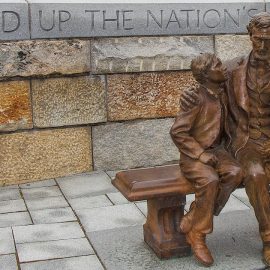

This article is an excerpt from the Shortform book guide to "Skin in the Game" by Nassim Nicholas Taleb. Shortform has the world's best summaries and analyses of books you should be reading.
Like this article? Sign up for a free trial here .
Are history books an accurate reflection of the past? Is the human past really as bloody as history books portray it to be?
According to Nassim Taleb, the author of Skin in the Game, academic accounts of human history give a warped perspective on our past. Historical accounts of the events emphasize conflict, creating an impression that human history is largely a record of warfare. However, history books tend to leave out unremarkable periods of peace, making the past seem more violent than it really was.
Here is why history is biased in its representation of the human past.
History Is a Warped Record of the Past
In his book Skin in the Game, Nassim Taleb argues that history is biased in its representation of the past. Historians fit historical records to their flawed political theories. Just like academics in other fields, they overestimate the accuracy of conjecture that cannot be proved. They can’t help but interpret history through their own understanding—which causes them to write history books that portray the default state of man without governance to be constant warfare.
Additionally, Taleb states that, due to the fact that history books must condense large spans of time, wars and conflict seem more common and impactful than they really were. Historical accounts put greater emphasis on conflict precisely because it is the exception to the norm.
| Pushing Back Against Academic Distortion in Schools There have been pushes in recent years to reform the way history is taught in schools for reasons similar to Taleb’s—reformers accuse schools of teaching history from a limited point of view that excludes valuable facts and perspectives from the narrative. American history classes are alleged to be overly nationalistic, idealizing past “wars for freedom” and failing to consider nuance when dealing with events regarding race, gender, and foreign policy. Some argue that the traditional narrative structure of history classes is what needs to be updated. One experimental undergraduate class based at Harvard deals in “cases” in which students are given the same historical information that historical decision-makers did, and are forced to weigh the issue at hand as if it is happening in real time. This method is intended to teach students historical context as well as valuable critical thinking skills. |
The Availability Heuristic
Another factor contributing to a distorted view of historical warfare is the availability heuristic: The psychological principle that people tend to put disproportionate emphasis on the ideas that most readily come to mind. In this instance, we overestimate the frequency and negative effects of historical conflict because our idea of it is so emotionally impactful.
We’re far more likely to think of the bloody American Revolutionary War than the evolution of the fur trade happening during the same time period.
(Shortform note: The availability heuristic was originally identified by psychologists Amos Tversky and Daniel Kahneman, as described in Kahneman’s book Thinking, Fast and Slow. It was first studied when researchers found that, when asked if there were more words in English that started with the letter “k” or had “k” as the third letter, subjects incorrectly guessed the former, as words that began with “k” came to mind more quickly and easily.)
Conflating Frequency With Loss
When judging the destruction of historical wars, people often make the false assumption that frequent conflict necessarily means worse conflict. Conflict should be judged by the negative impact it has on the population instead of the mere fact that conflict is happening.
Frequent skirmishes between smaller states can be a sign of relatively harmless jostling for power, which has little impact on anyone outside of the military itself. Often, commerce and quality of life can thrive despite war and conflict. On the other hand, it only takes one particularly intense war to send a nation into chaos and create millions of refugees.
To explain, Taleb discusses the recent history of Italy. Historians generally say that Italy was in constant turmoil before its unification into a single nation in the late 19th century. It consisted of several independent states that were constantly at war with one another. Taleb insists that the actual damage done by these battles was drastically less than the loss suffered when unified Italy entered World War One—which wouldn’t have occurred if Italy hadn’t been unified.
For these reasons, Taleb argues that institutions like large centralized governments aren’t as necessary to avert massively destructive war as many people assume. Decentralized, uninvolved states are much more stable.

———End of Preview———
Like what you just read? Read the rest of the world's best book summary and analysis of Nassim Nicholas Taleb's "Skin in the Game" at Shortform .
Here's what you'll find in our full Skin in the Game summary :
- Why having a vested interest is the single most important contributor to human progress
- How some institutions and industries were completely ruined by not being invested
- Why it's unethical for you to not have skin in the game






